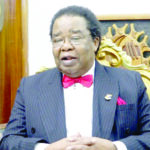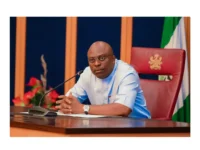Teenager Ibrahim Mbaye scored four minutes after coming off the bench to clinch a 3-1 victory for Senegal over Sudan in Tangiers on Saturday in the first Africa Cup of Nations last-16 match.
The 17-year-old Paris Saint-Germain forward represented France at age-limit levels before switching his international allegiance to Senegal, where his father was born.
Former champions Senegal will face Mali or Tunisia, who meet in Casablanca later on Saturday, in the quarter-finals.Rattled by an early Aamir Abdallah goal for Sudan, Senegal recovered to lead 2-1 at half-time through a Pape Gueye brace. Mbaye then put the outcome beyond doubt after 77 minutes.It was predictable result as Senegal are 99 places higher in the world rankings than Sudan, who were representing a country ravaged by civil war since April 2023.
Senegal made six changes to the team that started a 3-0 win over Botswana in their final group match. A notable absentee was suspended captain and centre-back Kalidou Koulibaly.
Ghana-born Sudan coach Kwesi Appiah retained only one of the team that began a 2-0 loss to Burkina Faso — forward Abdallah.It was the first meeting of the countries at an AFCON tournament. They were in the same 2026 World Cup qualifying group, though, with Senegal winning at home and drawing away.
Sudan rocked Senegal by taking a sixth-minute lead through Abdallah, a semi-professional who plays for an Australian second-tier club in Melbourne.
It was a superb goal as the Sudan striker took possession just inside the area and curled the ball over former Chelsea goalkeeper Edouard Mendy and into the net.– Ismaila Sarr unlucky –Sudan had qualified for the knockout stage as one of the best four third-placed nations despite failing to score in three group matches. An own goal brought victory over Equatorial Guinea.
A brave save from Monged Abuzaid on 29 minutes foiled Nicolas Jackson, who is on loan to Bayern Munich from Chelsea, but Senegal equalised almost immediately.
Former African player of the year Sadio Mane set up Pape Gueye, who equalised with a low shot into the corner of the net.Senegal were attacking continuously while Sudan had little to offer going forward in a match watched by Confederation of African Football (CAF) president Patrice Motsepe from South Africa.The Mauritanian referee pointed to the penalty spot after Ismaila Sarr was fouled by Abuzaid.
However, the decision was reversed after a long VAR review revealed a Senegalese was offside in the build-up.Ismaila Sarr from Crystal Palace then scored only to be ruled offside in another let-off for the Sudanese.
Abuzaid was constantly in action and did well to push away a Pape Gueye shot with an outstretched right hand as half-time approached.
There was still time for Pape Gueye to score again, however, and give Senegal a half-time advantage in the Mediterranean city.The goal was brilliantly executed by the midfielder from La Liga club Villarreal three minutes into added time. He used his left foot to side-foot a cross into the net past Abuzaid.
Senegal introduced Mbaye midway through the second half as they sought the insurance of a third goal. He made an immediate impact, latching on to a long pass and beating Abuzaid at his near post.
Follow The Eagle Online Channel on WhatsApp
[wpadcenter_ad id=’745970′ align=’none’]


















Leave a comment